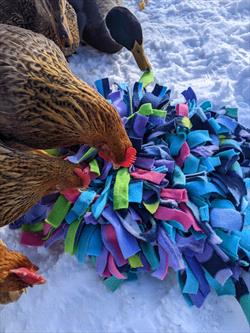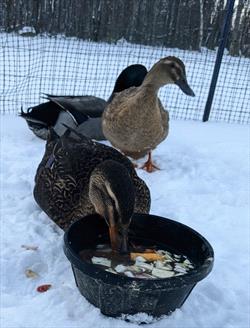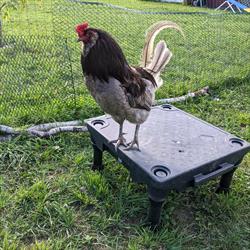Breanna Ask LSH bird 1.jpg

Photo Courtesy of Breanna Norris, KPA-CTP
Chickens, ducks, geese, and other “backyard birds” can be quite social and be wonderful pets. They need appropriate predator-proof housing, medical care, food, water, and enrichment. Enrichment helps your birds to thrive mentally and physically, and different species of birds may have their own unique enrichment needs.
Dirt Baths
Chickens not only enjoy a dust or dirt bath but need it for good health. This activity reduces parasites on the feathers, keeps them cooler, and helps to distribute natural oils through the preening process during these baths.
If a natural dirt hole does not exist, you can make one using a low-sided kitty litter pan with added sand or dirt which does not have any added fertilizer or chemicals. The litter pan needs to be big enough for large breed chickens like Bielfelders or Jersey Giant to get their bodies down in the dirt.
Snuffle Mats, Snuffle Balls, and Dog Puzzle Bowls
Ducks and chickens can both forage in snuffle mats. This is a great option when the ground is frozen. Black soldier fly larvae, mealworms, berries, and seeds can be sprinkled in a snuffle mat.
In warmer months, snuffle mats can be made of grass. If your chicken run does not have grass, then you can grow oat grass in trays. When the grass reaches one to two inches tall, sprinkle in treats and give the tray to your birds. They will forage for the treats, eat the grass, and dig in the dirt which are all normal bird behaviors.
Dog puzzle bowls and snuffle balls can be filled with snacks or food so that birds can forage. Birds also enjoy chasing and rolling the balls around.
Herb Planters
Plant perennial herbs like mint, thyme, and oregano in planter boxes. Once they are well established, you can place them in your chicken run. Put chicken wire over the boxes so that the birds can get to the plants but not dig in the dirt.
Hanging Food Activity
Kale leaves hanging from clothes pins can create a fun foraging activity for birds. Cabbage heads or homemade suet-type blocks can be suspended. The birds will stretch and hop up to get the treats, just like they would naturally jump at low-hanging branches.
Kiddie Pools for Ducks and Other Waterfowl
Ducks love the water and need it for good health and grooming. Providing a kiddie pool for swimming can be great entertainment for the ducks. Ducks will swim even in cold weather.
Deeper pools give ducks an opportunity to dive under the water but be sure to provide them with a ramp or other safe access in and out of the water.
Buckets and Other Water Sources
When a pool is not an option, buckets can be used so your ducks can fully submerge their head daily. This is not just enriching for the duck but also needed for good health and grooming.
Foraging for food in water
Ducks enjoy foraging for food in water. Sprinkle berries, peas, insects, sprouts, or vegetable peels in a deep dish or pool. Waterfowl maintenance food, sold commercially, floats on the water and can be fed daily to ducks and other waterfowl as their regular diet.
Breanna Ask LSH bird 4.jpg

Photo Courtesy of Breanna Norris, KPA-CTP
Exploring
If given the space, chickens and ducks can cover a lot of ground in a day, foraging for insects and plants along the way. While many ducks and chickens can live in small spaces, they should still have opportunities to explore and forage safely. If possible, allow for free-ranging times when you can monitor them or create a “chicken tractor” to allow the birds to safely move from one area to the next.
Clicker Training
Chickens and ducks can be clicker trained. Teach them to hop up on a platform, to target an object with their beak, or to come when called.
Breanna Ask LSH bird 2.jpg

Photo Courtesy of Breanna Norris, KPA-CTP
Roosting
Chickens and Muscovy ducks will typically roost at night in the coop. This provides a safe and draft-free place to sleep. When given the option, many will also roost during the day in their run.
Covered Outside Space
A covered run gives your birds space for enrichment opportunities year-round, regardless of the weather. Keep snuffle mats, dust baths, and other enrichment items dry and safe from bad weather. Greenhouse plastic on the roof and sides helps keep this space warm while hardware cloth keeps your birds safe from predators.
Birds are natural problem solvers and enjoy interacting with enrichment activities. By providing enrichment and meeting their specific needs, backyard birds can be a wonderful addition to your family. You may be surprised by how much personality they have.